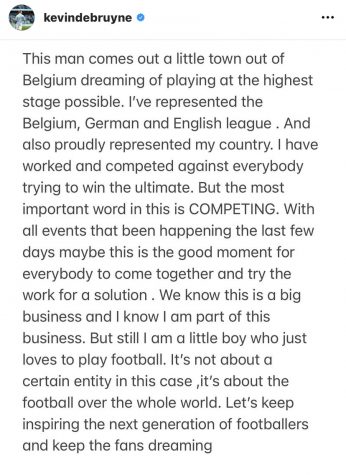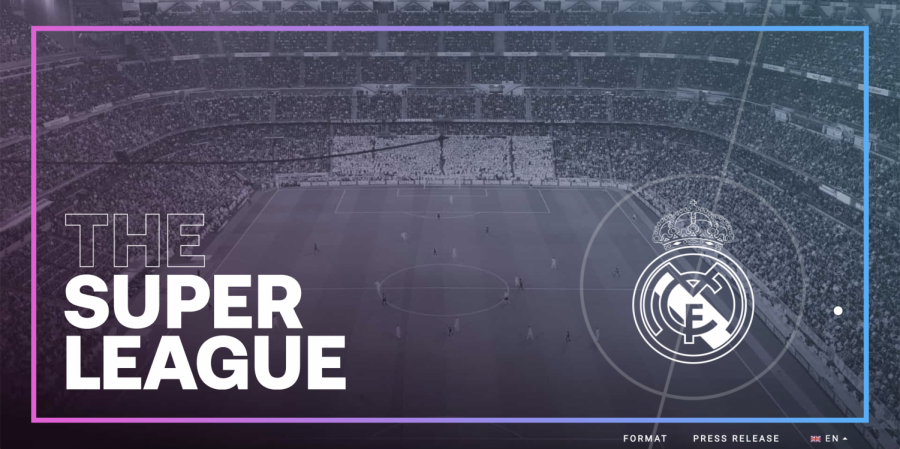A Failed European Super League
The football community was upset as 12 of the top European football clubs broke away to create their own competition.
Real Madrid, a football club which prides itself in being the team with the most Champions League trophies in history (13 of them), is willing to leave its glory in the past for a new competition.
Football is built on the idea of that which is earned, not that which is given. Every club in the Premier League, England’s top tier of football, does not have a permanent place there; if a team plays poorly enough, the club will be relegated to The Championship, England’s second tier football league. A club can start from the bottom and work their way up to the top. Manchester City, considered to be one of the best, if not currently the best, football club in the world, was once struggling to keep their place in the Premier League years ago. Working their way up, they now set the standard of excellence for football.
Each league in Europe will always have their strongest clubs. In Spain’s LaLiga, FC Barcelona and Real Madrid have been battling between first and second for as long as we can remember. In Italy’s Serie A, clubs like AC Milan and Juventus pride themselves on their long periods of dominance.
What if all of these heavy hitter clubs came together and made their own closed league? Instead of having to earn their way to the top, their historical status would allow them to play strictly with the top clubs in Europe.
To the shock of football fans, this actually happened. The Super League was announced to the world. Twelve clubs are in participation. AC Milan, Arsenal, Atletico de Madrid, Chelsea FC, FC Barcelona, Internazionale Milano, Juventus FC, Liverpool FC, Manchester City, Manchester United, Real Madrid CF, and Tottenham Hotspur, make up the Super League, all garnering a spot due to their history—not their current success.

Fans and famous footballers did not hesitate to express their disapproval of the Super League. Gary Neville, Manchester United’s famous defender, took to Sky Sports expressing his disappointment in the “Big Six” England football clubs, particularly towards Liverpool and Manchester United. “I’m disgusted with Manchester United and Liverpool the most. Liverpool, they pretend – ‘You’ll Never Walk Alone, the people’s club, the fans’ club,’” said Neville.
Fans in England took to their respective stadiums and protested during training sessions, and during and after games as well. In Chelsea’s 0-0 draw versus Brighton, fans protested outside Stamford Bridge, chanting for the club’s owner Roman Abramovich to “do the right thing.” Manchester United supporters picketed Old Trafford to protest against the Glazer family, the owners of United, urging them to back away from the Super League. Prior to the Leeds United versus Liverpool game, Leeds players wore “Champions League: Earn It” t-shirts in order to highlight the value of earning one’s way to the top competitions.
After strong disapproval from everyone, much to the relief of the football world, clubs began retreating from the proposed Super League just 48 hours after it was announced. Manchester City and Chelsea prepared papers to withdraw from the league during the protests, and the remaining English clubs announced their leave from the project throughout the day as well. Italian club Juventus’ chairman Andrea Agnelli stated the Super League could not proceed, despite his key role in bringing the project to life.
The drama within the week of the Super League highlighted the financial greed within the top clubs of Europe. With more than enough money at their disposal, these 12 clubs sought even greater pockets of money at the expense of their relationships with the fans. It highlighted the problem with the Champion’s League, Europe’s top football competition, where there were “too many lackluster matches, and not enough ‘big’ matches against the best teams,” as noted by Neville.
To address such issues, reforms are necessary within the competitions. The top clubs, especially ones with the most influence like Real Madrid and FC Barcelona, should not seek to break away from a top competition in order to fulfill the needs of their wallets. Football starts and ends with the fans, and in a sports culture where your spot is earned, a league built opposing that ideology is sure to upset avid football followers. Without the support of the fans, these “Super League” clubs would fail to have the recognition they hold in the football world today.
Football starts and ends with the fans, and in a sports culture where your spot is earned, a league built opposing that ideology is sure to upset avid football followers.
Sakeef Kibria is a Sports Editor for ‘The Science Survey.’ As Sports Editor, he supervises the submissions of articles and oversees the editing process...

